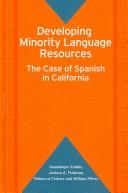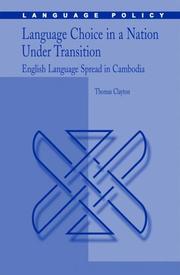| Listing 1 - 4 of 4 |
Sort by
|
Periodical
ISSN: 19071183 25812815 Year: 2006 Publisher: Lampung : IAIN Metro
Abstract | Keywords | Export | Availability | Bookmark
 Loading...
Loading...Choose an application
- Reference Manager
- EndNote
- RefWorks (Direct export to RefWorks)
Arabic language education --- Arabic language --- Study and teaching --- Semitic languages --- arabic language education --- Study and teaching.


ISBN: 1280507780 9786610507788 1853598992 9781853598999 9781853598982 1853598984 9781853598975 1853598976 Year: 2006 Publisher: Bristol Blue Ridge Summit
Abstract | Keywords | Export | Availability | Bookmark
 Loading...
Loading...Choose an application
- Reference Manager
- EndNote
- RefWorks (Direct export to RefWorks)
This book documents ongoing language shift to English among Latino professionals in California 67% of which studied Spanish formally in high school and 54% of which studied Spanish in college. Taking into account the recommendations about the teaching of Spanish as a heritage language made by these professionals, the book then describes current instructional practices used in the teaching of Spanish as an academic subject at the high school and university levels to “heritage” language students who, although educated entirely in English, acquired Spanish at home as their first language. The suggestions made by the Professionals concentrated almost exclusively on Spanish language maintenance (e.g., making cultural/historical connections; showing relevance and significance of language to students’ lives, teaching other subjects in Spanish, teaching legal, medical, business terms in Spanish). The study of goals currently guiding instruction for heritage speakers of Spanish at both the high school and the college levels, on the other hand, raise questions about the potential contribution of educational institutions to the maintenance and retention of Spanish among the current Spanish-speaking population of California.
Spanish language --- Hispanic Americans --- Hispanics (United States) --- Latino Americans --- Latinos (United States) --- Latinxs --- Spanish Americans in the United States --- Spanish-speaking people (United States) --- Spanish-surnamed people (United States) --- Ethnology --- Latin Americans --- Spanish Americans (Latin America) --- Castilian language --- Romance languages --- Study and teaching (Secondary) --- Study and teaching (Higher) --- Education --- Spanish. --- heritage language. --- language education. --- minority language.
Book
ISBN: 1280634340 9786610634347 0387286241 Year: 2006 Volume: v. 7 Publisher: New York, NY : [Great Britain] : Springer,
Abstract | Keywords | Export | Availability | Bookmark
 Loading...
Loading...Choose an application
- Reference Manager
- EndNote
- RefWorks (Direct export to RefWorks)
In the last years, we have witnessed significant advances in technology, which have not only changed our world but also become part of modern life. And like any other aspect of our lives, our work in the field of Languages for Specific Purposes (LSP) has also been transformed by technology, especially by the use of computers in our daily tasks as teachers and researchers. The purpose of this volume is to offer an overview of an ample variety of applications of IT in the field of LSP. It is addressed to a wide audience that includes LSP teachers and researchers, although the contents may also be relevant to applied linguists working in other fields. This book contains research studies as well as educational experiences and proposals, presented from different perspectives and backgrounds (both geographical and cultural), all of which are theoretically grounded and with a clear and sound rationale. Thus, the reader will find a variety of educational projects and research studies situated in specific educational contexts and in particular geographical locations. Although not intended for generalization, they are valuable technology-based educational solutions that offer new insight and reflections that will help readers create their own tools and carry out further research. For this reason, the book focuses on central topics that have awakened the interest of LSP professionals. In turn, this thematic selection has helped us organize the chapters into related sections covering the main areas of research and practice in the field.
Linguistics. --- Linguistics --- Computer programs. --- Linguistic science --- Science of language --- Language and languages --- Language and languages. --- Education. --- Applied linguistics. --- Language Education. --- Educational Technology. --- Applied Linguistics. --- Linguistics, general. --- Children --- Education, Primitive --- Education of children --- Human resource development --- Instruction --- Pedagogy --- Schooling --- Students --- Youth --- Civilization --- Learning and scholarship --- Mental discipline --- Schools --- Teaching --- Training --- Foreign languages --- Languages --- Anthropology --- Communication --- Ethnology --- Information theory --- Meaning (Psychology) --- Philology --- Education --- Language and education. --- Educational technology. --- Instructional technology --- Technology in education --- Technology --- Educational innovations --- Instructional systems --- Educational linguistics --- Aids and devices

ISBN: 1280609478 9786610609475 0387311947 0387311939 1441940596 Year: 2006 Publisher: New York : Springer,
Abstract | Keywords | Export | Availability | Bookmark
 Loading...
Loading...Choose an application
- Reference Manager
- EndNote
- RefWorks (Direct export to RefWorks)
This book examines language choice in contemporary Cambodia, and uses the case study to explore and evaluate competing explanations for the spread of English globally. Following the introduction, the multiple contexts in which Cambodians make individual and institutional language policy choices are considered. Chapters 2 and 3 examine the economic and political contexts for language choice, as Cambodia has transitioned from a planned economy and communism to a market economy and democracy. Chapters 4, 5, and 6 examine the assistance context for language choice; the bilateral, multilateral, and nongovernmental development agencies that have recently begun to work in Cambodia demand certain language skills of Cambodian employees and government counterparts, and support the learning of these languages in both nonformal and formal education. Individual and institutional languages choices Cambodians are making in economic, political, assistance, and educational contexts are described. Some Cambodians have chosen to learn French, making language policy decisions supportive of French language learning, in anticipation of education offered in French at universities locally and abroad. More Cambodians are studying and learning Chinese to procure jobs with firms owned or managed by Chinese speakers. A great many have chosen to learn English and to support English language learning in education. These decisions respond to the multiple demands and opportunities for employment with economic and assistance enterprises associated with virtually every nation or group of nations, for regional and international political communication, and for education in the global infrastructure of English-language universities. Having thus contextualized and described Cambodians’ contemporary language choices, the case study is applied to a theoretical debate in the field of language policy studies. The specifics of the Cambodian case fully confirm neither the "language choice" nor the "linguistic imperialism" explanation for the global spread of English. Rather, in Cambodia English is spreading as a result of both choice and promotion, it integrates with (though is not integral to) the contemporary global restructuring of the world, and has introduced results that, though aggregating toward amelioration, run the gamut from beneficial to exploitative for groups of Cambodians located variously along geographical, socioeconomic, ethnic, and other spectra. .
English language --- Language policy --- Germanic languages --- Glottopolitics --- Institutional linguistics --- Language and languages --- Language and state --- Languages, National --- Languages, Official --- National languages --- Official languages --- State and language --- Communication policy --- Language planning --- Government policy --- Language and languages. --- Language Education. --- Education, general. --- Sociology of Education. --- Foreign languages --- Languages --- Anthropology --- Communication --- Ethnology --- Information theory --- Meaning (Psychology) --- Philology --- Linguistics --- Language and education. --- Education. --- Educational sociology. --- Education and sociology --- Social problems in education --- Society and education --- Sociology, Educational --- Sociology --- Education --- Children --- Education, Primitive --- Education of children --- Human resource development --- Instruction --- Pedagogy --- Schooling --- Students --- Youth --- Civilization --- Learning and scholarship --- Mental discipline --- Schools --- Teaching --- Training --- Educational linguistics --- Aims and objectives --- Cambodia --- Languages.
| Listing 1 - 4 of 4 |
Sort by
|

 Search
Search Feedback
Feedback About UniCat
About UniCat  Help
Help News
News